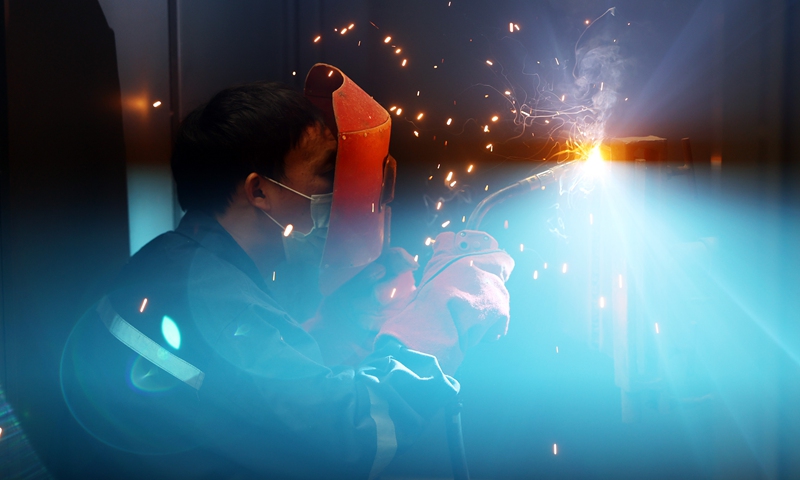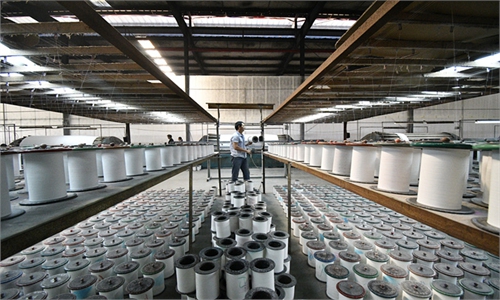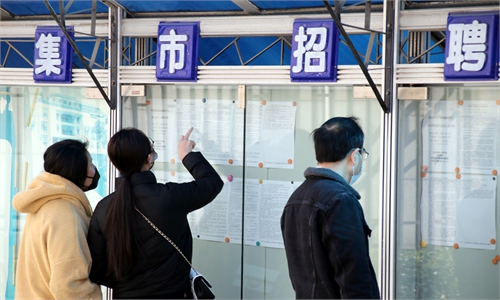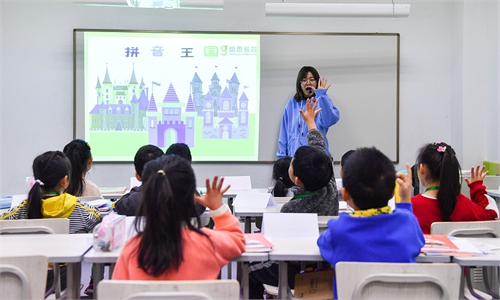China's medium and senior skilled labor shortage expands despite employment pressure

A welder in Nantong, East China's Jiangsu Province on November 20, 2020 Photo: VCG
With the arrival of winter, a bulk of companies have finished their recruitment drives for the year. However, some firms that targeted vocational and technical colleges as a source of new recruits have returned empty-handed. A teacher from a Shenzhen-based technical school said that many students have been snapped up by major enterprises before they finish their studies, with more than two offers per graduate.In recent years, the number of college graduates has increased, with the job market nearing a saturation point. According to data released by the Ministry of Education, in 2022, the number of college graduates is expected to exceed 10 million for the first time, reaching 10.76 million, an increase of 1.67 million compared with 2021.
With many industries and businesses struggling during the pandemic, civil service jobs have become a popular choice for new college graduates. This year, more than 2 million people applied to join China's civil service, with 68 people on average competing for one available position, a new record in recent years.
However, in contrast with the fierce competition seen within the national civil service exam, the shortage of medium and senior skilled workers is gradually increasing. According to a ranking of the 100 occupations with the "largest shortage of workers" in the third quarter of 2021 released by the Ministry of Human Resources and Social Security, 58 were classified as "manufacturing and related personnel" roles, including home refrigerator manufacturers, instrument manufacturers, welders and machinery manufacturing engineers.
High demand, stretched supply
A human resource manager surnamed He from a machinery manufacturing company in south China's Guangdong Province told the Global Times that as his company transforms and professionalizes its operations, its requirement for specialist workers is gradually increasing. This past 11 months have seen strong growth for mechanical design and production firms, who are now seeking a large number of senior technical engineers trained in Computer Numerical Control (CNC) technology.
He noted that the monthly salary of these positions is between 7,000 yuan ($1,098) and 10,000 yuan, and the company provides each employee with generous welfare as well as offering insurance and government stipulated housing fund payments. However, the company still remains short of front-line technical personnel.
Nowadays, many students from senior vocational and technical colleges are often snapped up by major enterprises even before they graduate.
"Each graduate has received two to four offers, so many enterprises that came to our school to recruit often return empty-handed," Sun Zhijuan, a director from Shenzhen Institute of Technology was quoted as saying in a report by the China Media Group.
Another director surnamed Wen said in the report that over past years, many enterprises have visited schools to recruit half a year in advance of graduation; now they seek for talent a full year or even two years in advance of students entering the labor market.
According to data released by the Ministry of Education, by 2025, the total number of skilled workers in 10 key areas of China's manufacturing industry including new materials, CNC machine tools, energy-saving and new energy vehicles, will be close to 62 million, with a talent demand gap of nearly 30 million, a 48 percent shortfall.
"The shortage has lasted more than three years. The long growth cycle and high practice cost of medium and senior skilled workers, coupled with the relatively backward level of vocational education in China over previous years, make the talent gap more serious," Zhang Yi, CEO of the iiMedia Research Institute, told the Global Times on Tuesday.
Moreover, the low social recognition of vocational education and the fact that many young people are unwilling to work in factories have also led to the shortage of skilled employees throughout the manufacturing industry, Zhang said.
"Some students would rather work as a delivery person or start their own business than work in a factory," an employee surnamed Chen from a German company offering vocational training services told the Global Times on Tuesday.
Rapid development, supporting policies
Experts have said that as the country increases its industrial upgrade policy, the demand for senior skilled personnel in the manufacturing industry is becoming more acute. And aside from joining the civil service, young people training to become technical specialists may become an emerging trend.
The National Bureau of Statistics data showed that from January to October this year, the profit of national industrial enterprises rose 42.2 percent year-on-year. Among them, the value added of national high-tech manufacturing industry in October increased by 14.7 percent. The young people have seen the future of China's manufacturing development.
"Vocational education has not been the last choice for Chinese students, and more and more skilled workers have gained a sense of achievement from their work," Zhang said.
Chen noted that many technical colleges in China have expanded enrollment for skilled students by 10 to 30 percent since authorities rolled out a series of policies to support the vocational education sector, and she believed that the number of skilled workers will increase in the future.
On December 9, the Ministry of Education issued an opinion that vocational bachelor's degree should be incorporated into the existing bachelor's degree system, and the certificate should have the same weighting in the labor market, graduate entrance exam and civil service exams, in order to eliminate prejudice against vocational education.
High-end skilled personnel are the backbone of China's transformation from a large manufacturing country to a strong one, and the cultivation of skilled talent has become increasingly key.
"Germany has a large number of highly qualified skilled workers with its high level of vocational education. Thus, many domestic technical colleges have learned from the experience from Germany including teaching concepts, equipment and teachers," Chen said.
In October, the State Council released a circular aiming to promote the high-quality development of modern vocational education. The document encourages listed companies and leading educational enterprises to participate in providing vocational education.
He said that the local government has promoted a series of talent training projects, and his company has set up a mechanic class in partnership with a technical college to train skilled workers.
"With the continuous improvement of domestic vocational education and the rapid development of manufacturing industry, I believe that China will have more high-quality middle and senior skilled workers," He noted.



